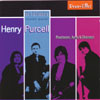Purcell Phantasies, Ayres & Chaconys
Locke especially profits from this concordant quartet of recorders
View record and artist detailsRecord and Artist Details
Composer or Director: Matthew Locke, Henry Purcell
Genre:
Chamber
Label: Deux-Elles
Magazine Review Date: 10/2007
Media Format: CD or Download
Media Runtime: 0
Mastering:
Stereo
DDD
Catalogue Number: DXL1123

Tracks:
| Composition | Artist Credit |
|---|---|
| King Arthur, Movement: First Music |
Henry Purcell, Composer
David Miller, Theorbo Henry Purcell, Composer The Flautadors |
| Suite No. 4 |
Matthew Locke, Composer
David Miller, Theorbo Matthew Locke, Composer The Flautadors |
| (9) Fantasias, Movement: F, Z737 |
Henry Purcell, Composer
David Miller, Theorbo Henry Purcell, Composer The Flautadors |
| (9) Fantasias, Movement: C minor, Z738 |
Henry Purcell, Composer
David Miller, Theorbo Henry Purcell, Composer The Flautadors |
| (The) Fantastick |
Matthew Locke, Composer
David Miller, Theorbo Matthew Locke, Composer The Flautadors |
| Aire |
Matthew Locke, Composer
David Miller, Theorbo Matthew Locke, Composer The Flautadors |
| Psyche, Movement: ~ |
Matthew Locke, Composer
David Miller, Theorbo Matthew Locke, Composer The Flautadors |
| Act Tune |
Matthew Locke, Composer
David Miller, Theorbo Matthew Locke, Composer The Flautadors |
| Symphony |
Matthew Locke, Composer
David Miller, Theorbo Matthew Locke, Composer The Flautadors |
| Prelude |
Henry Purcell, Composer
David Miller, Theorbo Henry Purcell, Composer The Flautadors |
| (The History of) Dioclesian, or The Prophetess, Movement: ~ |
Henry Purcell, Composer
David Miller, Theorbo Henry Purcell, Composer The Flautadors |
| Suite No. 3 |
Matthew Locke, Composer
David Miller, Theorbo Matthew Locke, Composer The Flautadors |
| (9) Fantasias, Movement: G, Z742 |
Henry Purcell, Composer
David Miller, Theorbo Henry Purcell, Composer The Flautadors |
| (9) Fantasias, Movement: D minor, Z743 |
Henry Purcell, Composer
David Miller, Theorbo Henry Purcell, Composer The Flautadors |
| Overture |
Henry Purcell, Composer
David Miller, Theorbo Henry Purcell, Composer The Flautadors |
| Timon of Athens, Movement: Curtain tune |
Henry Purcell, Composer
David Miller, Theorbo Henry Purcell, Composer The Flautadors |
| Dido and Aeneas, Movement: The Triumphing Dance |
Henry Purcell, Composer
David Miller, Theorbo Henry Purcell, Composer The Flautadors |
| Chaconne - Three parts upon a ground |
Henry Purcell, Composer
David Miller, Theorbo Henry Purcell, Composer The Flautadors |
| Abdelazer, Movement: Air |
Henry Purcell, Composer
David Miller, Theorbo Henry Purcell, Composer The Flautadors |
| Abdelazer, Movement: Jig |
Henry Purcell, Composer
David Miller, Theorbo Henry Purcell, Composer The Flautadors |
Author: Jonathan Freeman-Attwood
Akin to the pursuits of the Loeki Stardust Quartet of Amsterdam, that most durable of international recorder ensembles, the Flautadors take a distinctive view of Purcell’s instrumental oeuvre with a delightfully airy and “fantastical” programme. Interspersed by “fower part” consorts by Matthew Locke, (whom one increasingly considers must have mentored the young Henry in person), the guiding principle for Purcell is to “toy” with the recorder’s historical place in the courtly wind retinue of Restoration England by imagining a quartet as a viable medium for purloining the best chamber music of the period – for strings.
The Flautadors do not flatter immediately: the opening chaconne – a somewhat anomalous concept for an ostinato genre which closes proceedings in a Baroque opera – represents an uncomfortable idiomatic transfer from King Arthur, not least because of sour tuning. But from then on we are treated to some beautifully balanced consort playing. Both Locke suites are idiomatically and stylishly turned, and how sweetly the Airs ring out afresh from their poignant originals for viols; so, too, the luminous and haunting “Fantasie” from Locke’s Third Suite.
Tuning is a perilous business, with limited room for error in the high register especially. The great C minor Fantasia (No 7) never quite settles in this regard. The issue in the four Purcell Fantasias, in general, is not one of reconstituted timbres from viols – which effectively promote the primus inter pares ideal which Purcell’s “quartets” espouse – but how a habitually detached articulation crystallises the counterpoint while stifling the melodic character of Purcell’s profoundly personal essays. Indeed, it is the Locke I enjoyed most here but the final Purcell suite and chaconne are treasures, sensitively accompanied by lutenist David Miller.
The Flautadors do not flatter immediately: the opening chaconne – a somewhat anomalous concept for an ostinato genre which closes proceedings in a Baroque opera – represents an uncomfortable idiomatic transfer from King Arthur, not least because of sour tuning. But from then on we are treated to some beautifully balanced consort playing. Both Locke suites are idiomatically and stylishly turned, and how sweetly the Airs ring out afresh from their poignant originals for viols; so, too, the luminous and haunting “Fantasie” from Locke’s Third Suite.
Tuning is a perilous business, with limited room for error in the high register especially. The great C minor Fantasia (No 7) never quite settles in this regard. The issue in the four Purcell Fantasias, in general, is not one of reconstituted timbres from viols – which effectively promote the primus inter pares ideal which Purcell’s “quartets” espouse – but how a habitually detached articulation crystallises the counterpoint while stifling the melodic character of Purcell’s profoundly personal essays. Indeed, it is the Locke I enjoyed most here but the final Purcell suite and chaconne are treasures, sensitively accompanied by lutenist David Miller.
Discover the world's largest classical music catalogue with Presto Music.

Gramophone Digital Club
- Digital Edition
- Digital Archive
- Reviews Database
- Full website access
From £8.75 / month
Subscribe
Gramophone Full Club
- Print Edition
- Digital Edition
- Digital Archive
- Reviews Database
- Full website access
From £11.00 / month
Subscribe
If you are a library, university or other organisation that would be interested in an institutional subscription to Gramophone please click here for further information.




